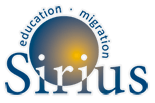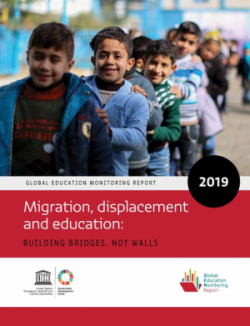SIRIUS’ PLA visiting team analysed and reflected on the outcomes of the Start the Change project implemented by FFE in 2016-2018
Continue readingPLA Ireland 2019
The PLA focused on the Delivering Equality of Opportunity in Schools (DEIS) and the Home School Community Liaison (HSCL) Scheme
Continue readingRegional Round Table in the Baltics
The 5th Baltic Inter-Ministerial Round Table: Estonia and Lithuania
Developing multicultural competence and language awareness in teacher education
Context
In Estonia and Lithuania increasing numbers of newly arrived migrants and returning nationals has emphasized the importance of an inclusive education system. Furthermore, long-living cultural minorities in both countries contribute to the diverse linguistic and cultural landscape in the region. This calls for policymakers and education institutions to take specific measures to facilitate the integration of children with a migrant background. The education systems in Estonia and Lithuania face several challenges related to migrant education. One of them is uneven school preparedness to address the needs of diverse learners and teachers lacking competences and skills to deal with diversity in the classroom. The latter aspect is of utmost importance as the success of migrant inclusion in education system in many ways relies on pedagogues and professional support staff in schools. Thus, a growing number of newly arrived immigrants and returnees highlights the importance of multicultural competence and language awareness to be introduced systematically in teacher education programmes. This has become an important policy priority in both Estonia and Lithuania, though the issue has been addressed inconsistently to date.
Both Estonia and Lithuania have undergone various reforms in higher education and teacher training over the past years. However, in Lithuania, the higher education reform did not yield the desired results. Even though the Lithuanian University of Education Sciences (LEU), which was the key HEI preparing future teachers, was reorganised and merged with Vytautas Magnus University (VDU) and a set of Education Academies, now in charge of teacher training, were created across Lithuania (at the premises of other HEIs), the content and quality of the educational programmes for teachers have barely changed (even though ranked very poorly previously). Furthermore, Lithuania has not adopted a comprehensive and clear framework of teachers´ multilingual and multicultural competences. Lithuanian policy documents do not explicitly require initial teacher education (ITE) universities and colleges to introduce courses that prepare future teachers for diversity. However, ordinance of the Minister of Education, Science and Sport of the Republic of Lithuania ‘On the approval of Description of the Study Area of Education and Training’ for ITE curricula do stipulate that prospective teachers should be able to develop a tolerant learning environment. This document also states that teachers should be able to adapt to the individual differences of learners stemming from the differences in gender, language, culture, ethnicity or social environment. Moreover, the national competency framework for teachers highlights the importance of teachers’ intercultural competences, including those related to ethnic/national identity of learners. However, due to ITE institutions’ academic, administrative and financial autonomy they have leeway in translating these provisions into courses and programmes. In practice, ITE curricula across Lithuanian universities and colleges do not explicitly seek to develop multicultural competences. Thus, teacher preparation for diversity depends on the choice and dedication of study module academic staff. As a result, specific diversity-related courses are, in most cases, not mandatory, while institutions lack relevant elective courses as well. One of the exceptions was Master’s in Intercultural Education and Mediation programme offered by Šiauliai University. The programme included mandatory courses on ‘Intercultural psychology’ (6 ECTS) and ‘Intercultural consulting’ (5 ECTS). However, the programme has been discontinued.
Due to unclear outcomes of the higher education reform in Lithuania, it is not feasible to indicate whether linguistically responsive and culturally sustainable pedagogy has been included in the development of a new teacher education curriculum. Nevertheless, representatives from Vytautas Magnus University have indicated that currently the university is aiming to include teachers’ preparation to address diversity and inclusive education in the university´s agenda. They have identified the need to develop linguistically responsive and culturally sustainable pedagogy (LRCS) in initial teacher training and in-service teacher training. The latter is particularly intended to support the older generation of pedagogues. Furthermore, according to the representatives from the Lithuanian Ministry of Education, Science and Sport, the ordinance of the Minister of Education, Science and Sport of the Republic of Lithuania ‘On the approval of the Description of Teachers profession competence’ (adopted in 2007) is currently being revised. Various stakeholders, including representatives from the Education academies, were invited to take part in the drafting process. As the document is in its drafting phase, the Ministry representatives highlighted that the Sirius round table was a useful contribution to this process by bringing the importance of linguistically and culturally responsive pedagogies to the attention of the Ministry and mapping various participants´ positions on this topic.
Similarly to Lithuania, in the context of large professional autonomy, the universities (University of Tartu and Tallinn University) that provide teacher education programmes are autonomous in designing the curriculum according to the national regulation, which emphasizes inclusive education but does not refer specifically to linguistically responsive and culturally sustainable pedagogy. It must be noted that the qualification requirements for teachers are different in Estonia and Lithuania. While in Lithuania the bachelor’s degree is required, Estonia has set a Master´s Degree standard. Currently, the preparation for teaching in linguistically and culturally diverse classrooms in teacher training modules is not consistent in Estonia. At the University of Tartu, multicultural competence is supported through achievements of a few study outcomes in two different subjects that are obligatory for all teacher training students. One of the study outcomes is ability to describe various opportunities to consider multicultural aspects in educational organisation. Vocational education teacher students have obligatory course “Multicultural education”. There is an elective course “A Student with a Different Language of Instruction in Estonian School” (Muukeelne laps Eesti koolis”) for teacher students. Similarly, the approach is unsystematic in Tallinn University where each institute decides on the curriculum content and the presence of multicultural competence. The courses about special needs education (including both theoretical and practical perspectives) are compulsory in all ITE programmes. Moreover, the practical training during the school placement is considered a priority in the development of the ITE.
The induction stage also reflects diversity-related issues within the face-to-face or e-training sessions between novice teachers and mentors. In Estonia the ITE providers offer specific training programmes or courses for mentors, for instance:
- at the University of Tartu, the master’s programme for school mentors includes the 3 ECTS course ‘Diversity in Education’;
- the Tallinn University offers a 4 ECTS course for school mentors and international school leadership programme Education 4 Future. The programme focuses on strategic partnerships, school culture, communication with parents, digitalisation of the learning process.
Overall, while the life-long learning strategy and general agreement on the need to address teacher preparedness to work with diversity is present both in Estonia and Lithuania and is addressed in policy documents mostly through the emphasis on inclusive education, the linguistically responsive and culturally sustaining pedagogy should be enhanced. Ongoing discussions and strategy planning at the ministerial levels in both Estonia and Lithuania represent a window of opportunity for SIRIUS to feed into the process.
National and Regional Round Tables 2019
NRT/RRTs were held as part of SIRIUS’ action at national and regional level
Continue readingVACANCY: Communications and Admin Manager for SIRIUS Network (3 days per week)
The selected candidate should ideally be able to start in February 2020. S/he will work 3 days per week. The deadline for applications is Wednesday 8 Jan 2020.
To apply, please read the Job description carefully and complete the Employment Application form, accompanied by your CV. Please make sure you fulfill all requirements and note that:
- Applications should be sent in English.
- Applications should be sent electronically to sirius@sirius-network.org with the subject line “SIRIUS Coordinator”. No paper application will be accepted.
- The deadline for applications is Wednesday 8 January 2020.
- Interviews will be held in mid-January 2020.
- Only candidates selected for an interview will be contacted.
EVALUATION REPORT: SIRIUS KEY ACHIEVEMENTS OVER THE PAST 7 YEARS
7 years after SIRIUS’ creation, the organization thinks it is time to rethink its strategy since the current one dates from 2014 and reflects the SIRIUS’ Clear Agenda for Migrant Education in Europe.
Continue readingPolicy Conference 2019 – “Inclusive education for all: from ideas to action”
The Policy Conference will look into three key thematic areas: 1) addressing socio-economic inequalities, 2) valuing and building on multilingualism in the classroom and 3) exploring synergies between non-formal education and schools for more equity and quality.
Continue readingStarting the change with policy recommendations!
The ‘Start the Change’ project aims at preventing radicalisation of young people in the society and promoting democratic values, fundamental rights, intercultural understanding and active citizenship in four European countries
Continue readingMigration, displacement and education: Launch of the 2019 GEM Report
This joint high-level event, hosted by UNESCO’s International Bureau of Education, will discuss key findings and recommendations from the 2019 GEM Report and reflect on the inclusion of migrant children and youth in national education systems and education’s role in making societies more resilient to migrant flows.
Continue readingEU-level policy workshop
SIRIUS’ European-level policy workshop engaged policy makers in inclusive debates with practitioners and researchers
Continue reading










